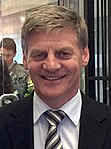The New Zealand National Party, shortened to National or the Nats, is a centre-right New Zealand political party that is the current senior ruling party. It is one of two major parties that dominate contemporary New Zealand politics, alongside its traditional rival, the Labour Party.

Sir Simon William English is a New Zealand former politician who served as the 39th prime minister of New Zealand from 2016 to 2017 and leader of the National Party from 2001 to 2003 and 2016 to 2018. He had previously served as the 17th deputy prime minister of New Zealand and minister of finance from 2008 to 2016 under John Key and the Fifth National Government.

Gerard Anthony Brownlee is a New Zealand politician and the 32nd speaker of the New Zealand House of Representatives. He was first elected as a member of the New Zealand House of Representatives for Ilam in 1996, representing the National Party. He became a list MP in 2020.

Judith Anne Collins is a New Zealand politician who has served as the attorney-general and minister of defence since 27 November 2023. She served as the leader of the Opposition and leader of the New Zealand National Party from 14 July 2020 to 25 November 2021. Collins has served as the Member of Parliament (MP) for Papakura since 2008 and was MP for Clevedon from 2002 to 2008.

Murray Stuart McCully is a former New Zealand politician. He is a member of the National Party, and served as Minister of Foreign Affairs from 2008 to 2017.

The New Zealand Young Nationals, more commonly called the Young Nats, is the youth wing of the National Party, a centre-right political party in New Zealand, and a member of the International Young Democrat Union.

David Allister Bennett is a New Zealand former National Party politician. He was the Member of Parliament for Hamilton East from 2005 to 2020 and a list MP from 2020 to 2023. He was Minister for Food Safety and Minister of Veterans' Affairs in the final year of the Fifth National Government.
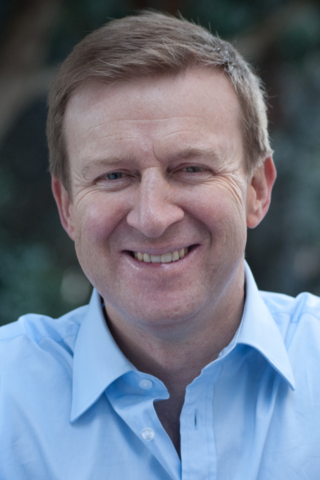
Jonathan David Coleman is a retired New Zealand politician and medical practitioner, who most recently served as Minister of Health and for Sport and Recreation under the Fifth National Government. Coleman also served as Minister of Defence and Immigration within the first two terms of that government, and represented the parliamentary constituency Northcote for the National Party from 2005 to 2018.

Nicola Laura Kaye was a New Zealand politician who served as Deputy Leader of the New Zealand National Party and Deputy Leader of the Opposition from 22 May 2020 to 14 July 2020.

Michael Allan Woodhouse is a New Zealand healthcare chief executive and former politician. He was a Member of Parliament for the National Party from 2008 to 2023.

Simon Joseph Bridges is a New Zealand retired politician, broadcaster and lawyer. He served as Leader of the National Party and Leader of the Opposition between 2018 and 2020, and as the Member of Parliament for Tauranga from the 2008 election to May 2022, when he resigned. Bridges is the first and currently the only Māori person to serve as leader of a major political party in New Zealand.
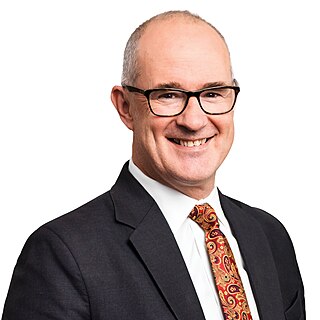
Philip Stoner Twyford is a politician from New Zealand and a member of the Labour Party. He has been a Member of Parliament since 2008. He is the Labour Party MP for Te Atatū.
The Fifth National Government of New Zealand was the government of New Zealand for three parliamentary terms from 19 November 2008 to 26 October 2017. John Key served as National Leader and prime minister until December 2016, after which Bill English assumed the premiership until the National Government's defeat following the October 2017 government-forming negotiations.
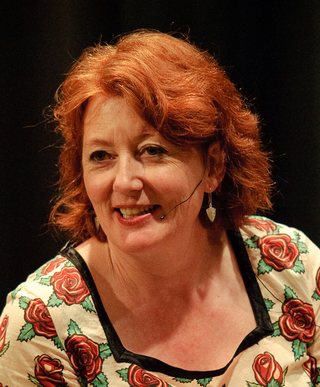
Margaret Mary Barry, generally known as Maggie Barry, is a New Zealand radio and television presenter and politician.

The 51st New Zealand Parliament was elected at the 2014 general election. This Parliament consists of 121 members and was in place from September 2014 until August 2017, followed by the 2017 New Zealand general election. Following the final vote count John Key was able to continue to lead the Fifth National Government.

The 52nd New Zealand Parliament was a meeting of the legislature in New Zealand, which opened on 7 November 2017 following the 2017 general election and dissolved on 6 September 2020. The New Zealand Parliament comprises the Sovereign and the House of Representatives, which consists of 120 members.
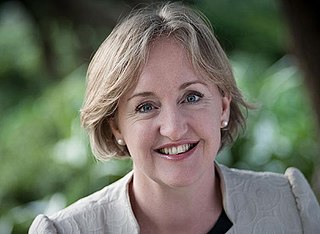
The 2018 New Zealand National Party leadership election was held on 27 February 2018 to determine the 12th Leader of the National Party. On 13 February 2018, Bill English announced his resignation as leader of the National Party, effective on 27 February 2018. He left Parliament on 13 March 2018. On 20 February, Deputy Leader Paula Bennett announced that a concurrent deputy leadership election would take place, in which she would stand.

The Shadow Cabinet of Simon Bridges was the official Opposition in the 52nd New Zealand Parliament between 11 March 2018 and 22 May 2020. It comprised all members of the New Zealand National Party, which was the largest party not a member of the Government.

The 53rd New Zealand Parliament was a meeting of the legislature in New Zealand. It opened on 25 November 2020 following the 17 October 2020 general election, and dissolved on 8 September 2023 to trigger the next election. It consisted of 120 members of Parliament (MPs) with five parties represented: the Labour and Green parties, in government, and the National, Māori and ACT parties, in opposition. The Sixth Labour Government held a majority in this Parliament. Jacinda Ardern continued as prime minister until her resignation on 25 January 2023; she was succeeded by Chris Hipkins.

The Shadow Cabinet of Judith Collins formed the official Opposition in the 53rd New Zealand Parliament, and previously in the 52nd Parliament. It comprised the members of the New Zealand National Party, which is the largest party not a member of the Government. On Collins' dismissal as leader on 25 November 2021, the cabinet essentially ceased to exist, but what remained was de jure led on an interim basis by her deputy leader, Shane Reti, until the next leadership election. The cabinet was succeeded by that of Christopher Luxon.
